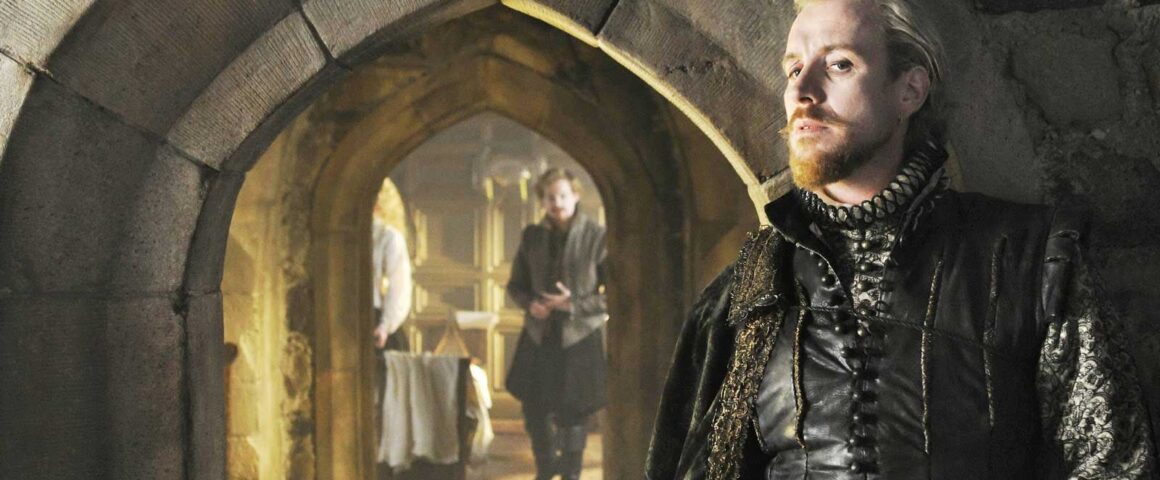Ding! Ding! Ding! It’s time for a brief lesson on the Bard of Avon — William Shakespeare. Born to a working-class family in early 1560s, and, with a sixth-grade formal education, he began as a successful actor in London. Later, ‘Peare branched out to writing plays, specifically comedies and tragedies. His more famous works, considered masterpieces by the literary community, include “Hamlet,” “Macbeth,” “Romeo and Juliet,” and “King Lear.” However, even as a respected poet and playwright before his death, his reputation as the world’s first dramatist and the grandfather of modern theater came posthumously. And along with popularity came accusations that he never actually authored his material — an argument that Roland Emmerich and his screenwriter John Orloff have exploited in Anonymous, an oddly quiet period piece from a director who’s made a career out of catering to the lowest common denominator.
Peculiarly, the film opens in present-day New York, on the set of an eponymous fictional play. Here, as part of the show, a narrator (Derek Jacobi) toys with the theory, veering off into a much darker explanation than what’s in textbooks. According to him, while Shakespeare (played by Rafe Spall) was gracing the stage in playwright Ben Johnson’s (Sebastian Armesto) works, the latter was approached by Edward de Vere (Rhys Ifans), The Earl of Oxford, who desperately searched for someone to publish his works under, as his status as royalty and the perception that the art scene was a breeding ground for evil required strict anonymity. However, discrediting de Vere’s talents, Johnson refused to mar his good name and left William to take the deal in his place. The rest, of course, is history (or at least the filmmaker’s kooky interpretation of it).
That’s just a brief synopsis for a long and contrived melodrama. Emmerich’s latest is a conspiracy theorist’s wet dream. It’s a fantastical, often overwritten, examination of coincidences that are disguised as facts, and historians can surely shoot holes in its logic (namely the claim that the real author, Edward de Vere, needed to remain nameless because of his position of power and the political subtext of some of his more provocative works). However with Hollywood concoctions it’s needless to do so, as the production was meant to be nonsensical entertainment. The problem with Anonymous is that, despite numerous factual errors, the story is told with sheer conviction and tries to make its case rather than being content with the overblown thriller that it was destined to be. In other words: It’s fair game.
Reportedly, Orloff discovered the authorship debate while working for an advertising firm. He began his research and convinced himself that the idea wasn’t as far-fetched as it first seemed. And surprisingly, there are actual scholars that support the explanation that the film proposes. Commonly called Oxfordians, they’ve included the likes of Sigmund Freud, Mark Twain, Helen Keller, and Charles Dickens, all of whom seriously contemplated the issue. Fortunately for us, the internet has since been invented; a simple Google search shows that The Earl of Oxford died in 1604, whereas Shakespeare continued to pen ten more plays — including active collaborations with other writers — until 1614. Of course Orloff would dismiss this as “academic normality.”
Now if only the drama wasn’t so boring. For the most part the personalities are either caricatures or cardboard cutouts. And while Shakespeare is reduced to being an illiterate country bumpkin who only dreams of fame, and Spall, despite of how obnoxious he may be, does his best to live up to that portrayal, Queen Elizabeth I (Vanessa Redgrave) and the Earl of Essex (Sam Reid) are only recognizable by their prestigious titles. This makes an already contrived tale of unrequited love, censorship, and power all the more vacuous. The only memorable persona in Anonymous is the Earl of Oxford. Obsessed with his craft, de Vera risks bankruptcy, his family, and empire, all to script stories that he won’t even be given credit for. Apart from excellent characterization, Ifans delivers a performance worthy of an Oscar nod.
The real winners, however, are the set-pieces and costumes, and they were done with only a fraction of the budget that Emmerich’s earlier works have had. Aesthetically, everything looks authentic, and this is a welcome change from the director’s usual explosions and earth-shattering catastrophes. Even if the narrative isn’t as epic as it should’ve been, one can’t deny that the characters and the locations look fantastic — the most impressive being a reconstruction of the Globe Theatre (which Shakespeare himself helped build).
It’s ironic that although the film has a distinctively quiet atmosphere, Emmerich is yet to release anything deeper than a visual delight; Anonymous is “2012,” but with natural disasters and John Cusack replaced by quills, paper, and funny hats.





'Movie Review: Anonymous (2011)' have 8 comments
October 30, 2011 @ 8:04 pm Byron
I haven’t seen the movie, but it seems rather disingenuous to pass off a concept as truth when in fact it is nothing more than a fringe theory.
October 30, 2011 @ 8:44 pm Howard Schumann
How many times do we have to hear the words “kooky” and
all the usual pejorative epithets before a reviewer actually does some research on this subject? If you are surprised that the Oxford theory has support, you probably don’t know much about it. Your review repeats the same old tired arguments that have no basis in fact.
The dating of the plays is pure guesswork and conjecture since no manuscripts have ever been discovered. Date of publication and date of performance say nothing about the date of composition. In fact, the year 1604 seems to have been some sort of a watershed.
No source for any Shakespearean play is dated after 1604. No sonnets were written after 1604. Between the years 1593 to 1604, seventeen plays attributed to Shakespeare were published. From 1605 to 1623 there were only five, said to be collaborations.
The Shakespeare myth has grown until today when it encapsulates a multi-billion dollar industry, defended by the academic establishment whose careers are on the line, and the Stratford tourist industry.
“Anonymous” can only be appreciated by people who have an open mind, who do not believe everything that is told to them by authority figures, and who are willing to investigate to get at the truth, whether it turns out to be consoling or distressing, orthodox or unorthodox.
October 31, 2011 @ 1:48 am Seattle Sam
I’ve yet to see anything come out of Emmerich that was worth the price of an admission ticket.
October 31, 2011 @ 7:55 am Muggle
So because the reviewer hasn’t done a deep enough dive into this theory, he is of closed mind? The facts he cites are true, as best we can tell. If anything, siding with a conspiracy theory with so few hard facts to back it up is being too open minded…
October 31, 2011 @ 12:36 pm Howard Schumann
I didn’t mean any disrespect for the reviewer who has pointed out some of the good aspects of the film. I was commenting on the status of the debate as a whole. There’s a lot of guesswork and conjecture out there that is passed on as being fact by those who support the orthodox interpretation.
I think this is a serious issue and a complex one that requires at least a cursory investigation before simply dismissing it with stuff like “silly”, “nonsense” and the like.
I think the so-called “Prince Tudor” scenario in the film is very plausible, even though it is currently a minority point of view, even within the Oxfordian camp (I don’t fully buy into it myself). I do think, however, there is quite a bit of evidence for Oxford’s authorship, however, and I think he will eventually be recognized as the author of the Shakespeare canon, even by the entrenched academic orthodoxy.
Keep in mind that Emmerich has said that this is one possible explanation for the mystery of why we know so little about Shakespeare, not THE explanation.
I do respect the reviewers view of the film but I don’t think that name calling and epithets really are very useful in approaching the issues it raises.
I saw the film again yesterday and I loved it even more. The drama is compelling and the acting uniformly superb, the film effects stunning and the story telling quality of the script wonderful. I highly recommend this film both for its historic relevance and for its sheer beauty.
October 31, 2011 @ 6:08 pm Howard Schumann
Byron – Emmerich has stated that his film is only one possible interpretation of the mystery of why we know next to nothing about the world’s greatest writer, not the only interpretation. I do think his scenario is plausible, however and I recommend that you see the film before dismissing it.
December 11, 2011 @ 9:04 am slopt
You guys are smarter than me. I like my entertainment less cerebral.
December 16, 2011 @ 8:20 pm Howard Schumann
Slopt – This film is not cerebral at all. It is rollicking good fun.